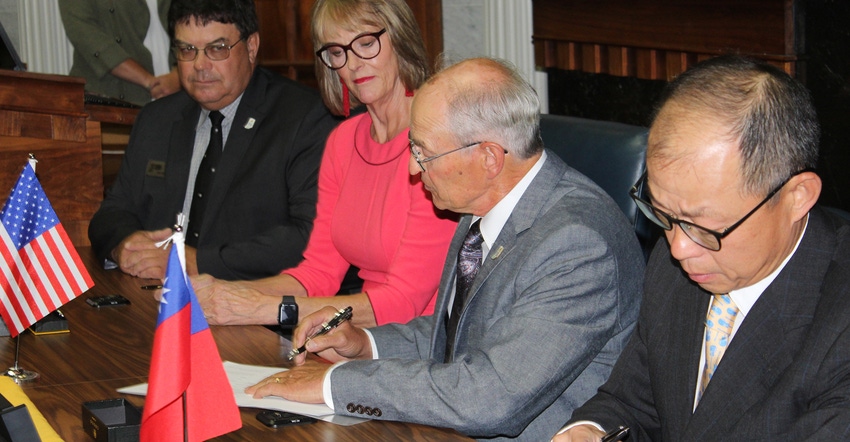October 7, 2019

Foreign countries still want what American farmers produce. Two recent events made that clear. At the same time, tariffs and the trade war with China continue, and Congress has yet to ratify the agreement that the U.S., Canada and Mexico reached in 2018.
Even though the trade picture for agriculture remains uncertain, Indiana farmers were excited to welcome a delegation of Taiwanese business leaders to Indiana. They signed agreements to buy both U.S. corn and soybeans.
Dave Blower with the Indiana Soybean Alliance and Indiana Corn Marketing Council reports two agreements were signed in the statehouse in Indianapolis. The Taiwan Vegetable Oil Manufacturers Association intends to buy between 2.6 million and 2.9 million metric tons of U.S. soybeans in 2020 and 2021. That amounts to 96 million to 97 million bushels of soybeans.
At the same time, the Taiwan Feed Industry Association agreed to buy 5 million metric tons, or about 197 million bushels, of corn, plus 500,000 metric tons of corn coproducts, including dried distillers grains, during the same time period.
The value of soybean purchases is estimated at $1 billion to $1.1 billion. The corn and corn products agreement could also reach $1.1 billion. The Taiwanese delegation visited other states, including Illinois, and made agreements there, too. Even if all soybeans, corn and corn products don’t come from Indiana, it’s still affirmation that foreign buyers want U.S. ag goods.
“With all of the challenges farmers have faced in 2019, we are very happy to sign this Letter of Intent with this delegation from Taiwan,” says David Rodibaugh, Rensselaer, vice chairman of ISA.
ICMC President Mike Beard, Frankfort, echoes those feelings from the corn side. “International trade is essential to the economic viability of Indiana corn farmers,” Beard says. “We thank the delegation from Taiwan for coming here, recognizing the quality of the crops we grow and signing this agreement. We hope to work with them for many years to come.”
Japan weighs in
When President Donald Trump and Japanese Prime Minister Shinzo Abe announced a trade agreement on Sept. 25, it reverberated all the way to Indiana. The Trump administration says this agreement will not need approval by Congress and becomes effective once ratified by Japan’s Legislature. Through the agreement, Japan would agree to cut or eliminate tariffs on corn, beef, pork and other commodities. It’s similar to what Japan agreed to in the Trans-Pacific Partnership. Trump withdrew the U.S. from that deal early in 2017.
That makes reaching a deal with Japan seem even more important. Still, the administration says this is just the first step in what it hopes will be a more comprehensive trade agreement with Japan.
That didn’t dampen the enthusiasm in Indiana when this first agreement was announced. “For Indiana farmers to remain sustainable and competitive, we need to maintain foreign markets for our crops,” says Indiana Corn Growers Association President Sarah Delbecq, Auburn. “This deal with Japan continues and strengthens the relationship between Hoosier corn farmers and an important trading partner.”
Despite the good news, much work remains to be done. Everyone agrees on that point. Congressional approval of the Canada and Mexico agreement would be a great next step.
Comments? Email [email protected].
You May Also Like




